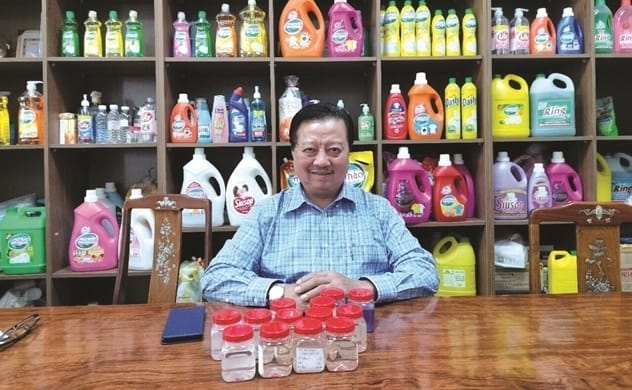
Ông Lương Vạn Vinh, Tổng Giám đốc Công ty Hóa mỹ phẩm Mỹ Hảo.
Writer of this story eventually met My Hao Cosmetic Chemical Company General Director Luong Van Vinh after several attempts. Vinh claimed he shopped in the North, West, Central, and Cambodia. Sometimes he was out more than at home.
He went to the market often before the pandemic outbreak, but since 2021, he has gone more often. “Even though there are sales staff in the province, I still want to survey the market to understand the detailed situation and adjust according to needs,” he said.
“I thought the most difficult time was when the COVID-19 pandemic broke out. In fact, in the past 2 years, the company has had to continuously find new directions, innovate products, and find new markets, even accepting lower profits of only about 5% to keep the market,” Mr. Vinh shared.
By the end of the first nine months of 2023, the company had only achieved more than 50% of the year’s sales target. My Hao still has more than 2 months to earn 20% more target; fortunately, orders for the last months of the year are also increasing. “This year we have to try to achieve 80%,” he said.
The consumption market is slow, and the company’s products are sold more through traditional channels than modern retail channels. “Now consumers want good prices and good-quality products, so in the year-end season, My Hao will launch more attractive promotions, strengthen market care, and increase coverage,” he said.
Mr. Vinh gave each salesman 240 addresses to visit weekly, emphasizing prompt restocking and selling various kinds of goods. “If Phnom Penh goods are scarce or slow to distribute, Chau Doc goods will flood in. No encroachment is allowed. I have to rush there to check sometimes. One benefit is that My Hao’s items now have identifying tags, so we can promptly check for encroachment,” he said.
Mr. Vinh estimates that traditional channels and major distributors offer a 10-12% retail discount, including warehouse, shipping, delivery, and administration. Profit is just 5–6%.
Grocery and retail discounts add 20–25%, or 35–37%. Supermarkets require a 35–40% discount, which is high, but if they don’t spend on other shelves or promotions, they can only put one product on the counter, which shoppers can’t see. Promotional deals and price cuts lasted one week before rising again.
My Hao spends less than 2 billion dong on advertising, just 1-2% of its competitors, whereas multinational companies spend tens to hundreds of billions. Thus, Vietnamese items that have yet to reach supermarkets have moved to the suburbs and small provinces”, he acknowledged the challenges domestic brands face.
At this time, Mr. Vinh’s children in the US joined in to help their father. The second daughter who is responsible is the second daughter, who has worked in the US and knows the law well, so she researched the procedures. “Here, we sent the documents requested by the US agency so that our daughter could proceed with the procedure. Thanks to a contact person who understands the law, it’s easy to do, and the cost is much lower,” he said. “The American side is very standard, not arbitrary. The standard is to use the correct substance; then we must use that substance; even if another substance is better, it is not okay,” he added.
Just one month later, My Hao received an FDA license to export dry hand sanitizer gel, hand sanitizer, and antibacterial spray. After nearly 3 months, 7 containers have arrived at one of the world’s epidemic centers. On American shelves, bottles of hand sanitizer still carry My Hao’s own brand; the packaging is only different from the Vietnamese market in that it is in English.
“I have been exporting to the US for a long time, but they are products that do not require FDA approval, such as dishwashing liquid, laundry detergent, etc. Therefore, when I sell hand sanitizer gel there, it is sold quickly because I have built a good reputation. Reputable, available customers, and distribution channels at supermarkets,” Mr. Vinh said.
He added that customs and collectors carefully examined the initial batches of hand sanitizer gel to assess their level of compliance with the FDA license.
In My Hao’s product structure, dishwashing liquid still holds the largest market share with more than 60% of total revenue, and for many years, My Hao dishwashing liquid and house cleaning liquid have been exported to North Korea and China, Mongolia, Cambodia, Laos, the Philippines, and America. In Cambodia, My Hao products consume 120 tons each year.
After the pandemic ended, the hand sanitizer gel market slowed down, but hand sanitizer still sold very well. In addition, the pandemic also made consumers more concerned about home hygiene and clothing conditions, so he thought about producing more laundry and floor cleaning products with antibacterial properties.
Although the export market accounts for less than 10% of My Hao’s total sales, Mr. Vinh believes that it is still very large to exploit. “Of course, in a large market, competition is also extremely fierce. Buyers accept their purchases but force prices a lot. Anyway, this is also an opportunity for Vietnam,” Mr. Vinh said.
Mr. Vinh’s path to the dishwashing liquid business had many opportunities. Mr. Vinh started working to make money at the age of 10, he went to school to make incense. At the age of 16, he sold bicycle parts on the side of Thuan Kieu Street. At the age of 17, he switched to selling groceries outside Binh Tay Market, District 6. After the country’s reunification, business was difficult, so he went to work for a soap factory.
This was also the opportunity for him to open My Hao Company. At that time, there was a state-owned enterprise that imported several hundred tons of foaming agent but had no buyers. As a person in the cosmetic chemistry industry, he found that he could use this material, but it was impossible to use it to produce shampoo, and it was also difficult to make other types. After a period of research, he thought why not produce dishwashing liquid when the market does not have this product yet.
So he bought some raw materials from that business and started producing dishwashing liquid. The bottles of My Hao dishwashing liquid that came to the market were quickly chosen by customers and sold out as many as were produced. From the initial few tens of tons of raw materials purchased, he bought the entire batch used for production in the following years.
“At that time, the products we made were not enough to sell. My Hao dishwashing liquid is very popular with customers. The Company’s soapberry shampoo also sold like hotcakes because at that time shampoo was very rare. The amount of goods sold in the Northern market per day is up to 500 boxes (100 bottles/box). We produce and do business in a leisurely manner, without pressure because there are buyers for every product we produce. We just produce and deliver to agents, but how to sell, how to sell, and to whom we sell is up to the agent. The whole province often only needs one distribution agent. The Company’s sales grew quite rapidly in those years,” he recalled.
However, realizing the opportunity, multinational corporations stepped in very quickly and methodically. After only 2 years, My Hao lost about 50-60% of its market share. Sales dropped from 30-35 billion VND to 20 billion VND in 2007-2008. In the field of cosmetic chemicals, in Ho Chi Minh City, Vietnamese enterprises have about 10 manufacturers such as Vinh Ky, Truong Ky, Bong Sen, Hiep Hung, Nu Hoang, Thuan Phat… Like My Hao, they are Long-standing manufacturers, but because they did not change quickly according to demand, lost the market and today only a few small brands still exist.
However, Mr. Vinh was not discouraged. He aggressively sought to regain market share. Strong discounts, accepting no profit or very low profit, mobile sales in every corner and alley. In particular, My Hao launched a marketing team of up to 500 people to go to regions to promote and sell. Luckily, 50% of dealers agreed to change. The application of the new distribution model brought very good results when My Hao’s sales gradually increased and developed more than before, especially in the Mekong Delta provinces, the Northern region and Ho Chi Minh City.
The habit of going to the market has followed Mr. Vinh since then. Although the Company has a strong sales team, in charge of each area, Mr. Vinh still wants to go to the place and work directly in the markets so that when encountering difficult problems, he can provide quick and accurate solutions. “If the communication is good but the product is not available on the market and is not of good quality, it will fail. Going to the market is not only for business but also for me to care for my employees. Thanks to such trips, I understand more about the employees, share with them and guide them when necessary,” Mr. Vinh shared.
In 1998, My Hao received a buyout offer of 10 million USD and gradually raised it to 30 million USD. Recently, My Hao was valued at 40 million USD by a unit. Faced with offers to buy back, Mr. Vinh refused.
“If you can’t ask to buy it, foreign businesses will turn to “soliciting” the processing for them. Many businesses invest in large production lines, but they do not run at full capacity. Hearing that they were offered a job as a machinist with good pay, it was during a time when workers needed jobs and the factory needed to maintain operations, so they accepted the job immediately. But that’s just the scenario. At first, they signed big contracts. So domestic enterprises only worry about processing and neglect the production and development of goods business. Suddenly, the foreign partner announced to terminate the contract and no longer hire. At this time, it is too late to return to selling products that we produce ourselves,” owner My Hao shared the reason why he did not sell himself or accept outsourcing to foreign companies.
After refusing to sell to foreign corporations, My Hao had to enter a rather tough battle. However, he was never discouraged. “Business is sometimes fun, sometimes stressful, but I still love my job! I once settled in the US with my children, but then because of my love for this job, I returned to my homeland. Moreover, I’m used to doing business, so I don’t find it difficult and will do it until I have no more strength left,” Mr. Vinh confided.
He excitedly said: “I have seven children, but most of them go to school and settle abroad. Fortunately, a son recently brought his wife and children back to Vietnam to help with his business. I have transferred 50% of my work and hope my children love the job as much as I do.”





